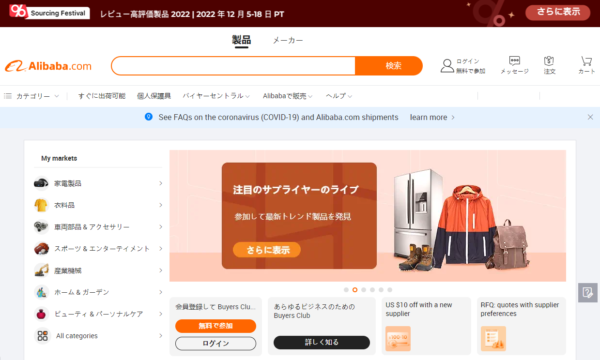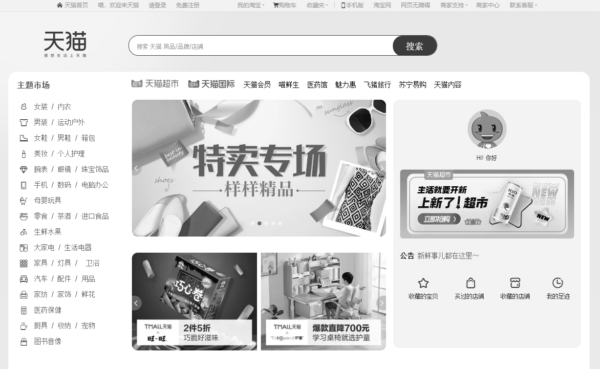The “bombing”, which is still fresh in our memories, has been reduced by the Corona disaster, and inbound sales have been decimated. Against this backdrop, there is a growing demand for cross-border e-commerce business, which is an effective sales strategy for overseas customers.
This article explains the various risks involved in entering the Chinese market for cross-border EC, as well as measures to prepare for these risks.
目次
What is China’s cross-border EC, a market that continues to expand?

China’s e-commerce market is mostly mall-based, and the market size continues to grow as cheap smartphones and other devices make shopping easier.
Cross-border EC from Japanese businesses is also expanding in countries other than China, but we will focus on the EC market in China, where market growth is particularly remarkable.
Market size of China’s cross-border EC
According to the Ministry of Economy, Trade and Industry, Chinese consumers purchased 1,949.9 billion yen in goods from Japanese businesses in FY2020.
Since U.S. consumers purchased 972.7 billion yen in goods from Japanese businesses, this means that Chinese consumers purchased more than twice as many goods from Japan as U.S. consumers.
Conversely, the amount of goods purchased by Japanese consumers from Chinese businesses was 34.0 billion yen, which, from Japan’s perspective, would suggest a significant trade surplus. In addition, the amount of goods purchased by Chinese consumers from U.S. businesses was 2,311.9 billion yen.
Year-over-year, %増、日本は17.8% U.S. were up 15.1 %増、日本は17.8%, indicating that attention to made-in-Japan products is increasing year by year.
Therefore, it is believed that there is still more latent demand in the Chinese EC market than in Japan.
EC malls are common in the Chinese cross-border EC market
The Chinese market has been revitalized by the shift in demand from consumers who can no longer casually travel abroad to cross-border e-commerce.
E-commerce malls are widespread in Japan, and the same is true in China. Companies such as Tencent, Alibaba, and Tmall are often heard of in Japan, and each operates its own e-commerce mall.
In China, it is common to access e-commerce malls with a smartphone and shop within the mall. In Japan, if there is something you want, many people may first search for it on Amazon or Rakuten.
Chinese consumers often tend to refer to the purchasing behavior of others in order to buy what they expect, so evaluations within malls are strongly related to sales.
As a seller, you need to keep a close eye on consumer evaluations, and it is important to gain trust in your brand and products through China cross-border e-commerce.
China Cross-Border EC Expands with Spread of Cheap Smartphones
One of the reasons why the Chinese cross-border EC market is expanding year after year is the spread of cheap smartphones. Consumers who were previously unable to buy products on the Internet, or who could not handle computers well, can now easily shop with a single smartphone.
Furthermore, Chinese people are potentially willing to “avoid the risk of buying counterfeit or pirated products” when shopping in their own country.
The ability to easily purchase genuine products from overseas, even from within Japan, has been a major factor in the growing need for cross-border EC.
Advantages of China Cross-border EC

The greatest advantage of participating in cross-border EC in China is the ability to develop an effective sales strategy by expanding sales channels.
Chinese consumers are said to not trust products made in their own country in daily necessities other than luxury goods, which is probably why daily necessities and consumables made in Japan are also popular.
If you can satisfy the needs of Chinese consumers with Japanese products and gain their trust as a brand, repeat customers will increase. The reputation of your products in the mall will also increase, leading to even more effective PR through word-of-mouth spread.
With cross-border e-commerce, which does not require setting up a physical store locally, you can expand your business overseas while reducing the cost of entering the Chinese market and avoiding the risk of wasting fixed costs due to China’s changeable business practices.
Explaining the Risks of Cross-Border EC in China
When many people hear the word “China,” they may have an image of an unstable situation. In order to enter the China cross-border e-commerce market and seize great business opportunities, it is important to understand the risks beforehand and be prepared for them.
For example, we must be sure to understand the cultural differences between Japan and China, the differences in consumer values, and the differences in standards regarding laws and regulations.
We will explain the risks of entering the China cross-border EC market in detail, so please refer to this section.
Difficulty in communication due to differences in culture and values
Different countries have different languages, cultures, and consumer values, and thus different shopping trends emerge.
First of all, when the language is different, all administrative procedures and other hurdles become more difficult. Because it is difficult to communicate, even simple interactions that would not normally lead to trouble can lead to claims and problems.
Due to differences in culture and values, there are many cases where, for example, Chinese consumers do not care about what we take care of when selling to Japanese consumers, or conversely, there are consumers who care about things that Japanese consumers do not care about. It is also necessary to devise how to write details and precautions on product pages.
The best way to achieve success in cross-border EC in China is to deepen our understanding of the Chinese consumer.
What to do in case of credit card fraud
In the case of fraudulent use of credit cards in cross-border e-commerce in China, it is very difficult to recover the money.
For example, a minor child uses a parent’s card without permission. The transaction will be canceled, but in some cases, the price or goods may not be recoverable due to the fact that it crosses a border.
It will likely be a bone-dry, tiring profit for you to file a lawsuit against the overseas consumer. Even though this kind of trouble does not happen often, it is important to be careful with high value transactions.
Cost of being sued due to damages
In the e-commerce business, there is a risk of being sued if a consumer is injured by a product sold. For example, if a product sold is damaged during transportation and the consumer is injured by the debris.
If a lawsuit is filed by a Chinese consumer, in addition to compensation, there will be other costs such as legal fees to deal with cross-border problems, travel expenses, and in some cases, interpreter fees.
In the event of a lawsuit, it is essential to have product liability insurance, as it could have a negative impact on the reputation of the mall and subsequent sales performance.
Differences in standards regarding laws and import regulations
Since laws differ from country to country, unexpected items may be subject to import restrictions. In addition, food additives and pesticides are judged according to different standards than in Japan, so it is necessary to know whether your products fall under these criteria.
For example, in the case of “goods shipped from Japan to China were returned without customs clearance,” the only damage is the shipping cost. However, if, after opening a store in a mall, the goods shipped are actually in violation of Chinese laws, in some cases the goods will not be returned, resulting in significant damages.
In addition to researching the demand for your products, it is important to do a thorough preliminary investigation to determine whether the products you wish to sell can be sold under Chinese law.
Changes in commercial law in the context of the situation
In these days of rapidly changing world affairs, it is important to pay attention to the fast-changing business practices in China.
In many cases, the Corona Disaster changes the rules for selling products across borders, so it is important to find out in advance whether your products can be handled in China cross-border EC.
In this day and age, it is possible that a product that was cleared through customs yesterday may not be accepted today, so the ability to gather information is also essential.
Measures to capture the risks of cross-border EC in China

Risk hedges such as a better understanding of Chinese consumers, language skills, preparing risk notices, purchasing insurance, and gathering information to capture changes in Chinese commercial law are necessary.
When problems occur in cross-border EC, the risks are completely different from those in domestic EC. For example, if there is a lawsuit, you may have to travel to China. The amount of damages and the costs involved in resolving unforeseen situations may not be comparable to those incurred in Japan.
For businesses that are about to enter the China cross-border EC business, we will explain in detail what measures can be taken to capture the risks.
Understanding Chinese consumer psychology and purchasing behavior
Not only in China, there are more than a few differences in common sense between foreign countries and Japan, and the origins, history, and ways of thinking vary from country to country.
Chinese consumers differ from Japanese consumers in what they think about in order to make a purchase that meets their expectations.In Japan, word-of-mouth communication and reputation are important, but in China, they are even more important requirements.
One risk hedge is to experience life in China in order to understand the differences between Japanese and Chinese culture, consumer psychology and purchasing behavior.
Acquire the language skills to converse with Chinese consumers
Having the language skills to converse with Chinese consumers will improve customer satisfaction.
Although the Chinese EC market is generally mall-based, most inquiries from users are made via chat on the site. Therefore, improving the quality of inquiry response and focusing on things such as reply speed will improve customer satisfaction.
It is essential to have a minimum level of language skills to be able to converse with users, as problems such as poor quality of responses and slow replies can lead to lost opportunities.
There are different types of Chinese, such as Mandarin, Cantonese, Shanghainese, Hong Kong, and Taiwanese, and there are two types of written characters: simplified and traditional.
The first hurdle in entering the cross-border e-commerce business in China will be to overcome the major barrier of language.
Prepare a risk notice for all eventualities.
Measures against unauthorized use of credit cards and compensation for damages should be clearly stated on the product page or in an easy-to-understand location on the site, clearly stating the risks to the consumer.
In general, from the viewpoint of protecting consumer rights and interests, it is necessary to make the product “in such a way that the customer cannot order the product unless he or she agrees to the risk notice.
If you sell high-value products, you should also take measures such as making it impossible for consumers to place orders without sending a copy of their ID or credit card statement.
With regard to compensation for damages, PL insurance can significantly avoid the risk. However, conditions and other factors vary depending on the nature of the business, so close consultation with the insurance representative is necessary.
Comply with China’s Commercial Code
Items for which import restrictions may differ between the Chinese and Japanese sides.
To avoid violating regulations, please check the latest information on imports and exports at the Japan External Trade Organization (JETRO) in advance.
In addition, in China these days, it is mandatory to open the package and check the contents when clearing customs. For example, if you sell and ship LED lights and list them under a large bundle such as “home appliances,” customs may reject your goods because the contents are different from the description.
Depending on the goods to be shipped, items may need to be described in detail and shipped in accordance with the rules so that they can be checked smoothly by Chinese customs.
Strict packaging for delivery of goods
Chinese customs will clear the goods if they conform to the rules, and will not clear them if they do not.
For example, there are many countries that do not have the concept of “Tenchi Muyo”, which is common among Japanese domestic delivery companies.
International shipping routes from Japan include airplanes and ships, but it is commonplace for cargo to be carried upside down in transit or for cargo to be subjected to impacts during transportation.
The products must be carefully packed so that they will not be damaged in such a harsh transportation environment.
Even if the shipping carton is torn or dented, it will not lead to a claim as long as the product inside is intact.
Also, please note that if a liquid or other substance leaks from your luggage during transportation and wets other luggage, you will be liable for damages.
Be sensitive to world affairs.
If you are considering cross-border EC in China, you need to be sensitive to information regarding diplomatic relations between China and Japan. In these days when the situation is so volatile, it is important to check the latest information released by Japan’s Ministry of Foreign Affairs and other organizations on news sites on a regular basis.
In particular, Chinese rules change frequently and at a dizzying pace. Failure to keep up-to-date with the latest information can lead to serious damage due to violations of regulations caused by lack of knowledge.
For example, it is important to hedge risk by anticipating when import regulations or rules on transportation methods will change, as risks such as a sudden increase in tariffs on certain items can be anticipated.
summary
When entering the cross-border e-commerce business in China, the risks include language differences, credit card settlements, damages, and the ease with which commercial laws can change. To avoid major damage, learn the language, prepare a risk statement, purchase insurance, and stay informed.
If Japan’s population is on the decline and inbound sales cannot be expected as in the past, cross-border EC is still a very attractive market. However, when selling to overseas consumers, it is first necessary to deepen understanding of the other country.
China, in particular, is a country where the EC market continues to grow at an alarming rate. While anticipating that the values of Chinese consumers will change on a daily basis, try to develop a strategy that will enable you to effectively sell your products and services through cross-border EC.
Winning in cross-border EC in China” will also contribute to Japan’s national interest. In order to succeed, let’s take all possible measures to prepare for risks.





















